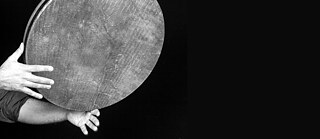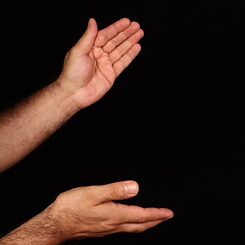“Do Jar” brings various Kurdish rhythms together and combines multiple distinct sound sources (instruments and synthesizers), providing the listener with an aural feel for how Kurdistan sounds.
“Do Jar” means “Twice” and is a sort of meditation on the duality of the two main percussive instruments being used; the bandir (frame drum), and the daf (another type of frame drum).
The latter is considered the national instrument of the Kurdish people. The daire (a frame drum from Azerbaijan) also subtly accompanies the two, bringing together percussive instruments from different geographic regions with Kurdish ties. Zahawy deliberately played rhythms with triple and double timings on the daf, while experimenting with performance technique, ways of using the instrument, and its sounds.
Because Kurdish culture relies on oral histories, music plays an integral part in preserving events from deaths to births, invasions to massacres. It also often refers to religious themes and seasonal events like the harvest, focusing on nature. The daf helps tell these stories through its beats and rhythms. Unlike other percussive instruments, it is played with two hands at once, making it more challenging to play. For this composition, Zahawy innovated his technique in how he plays the daf.
Zahawy used rhythms found mainly in Sufi ritual ceremonies in this track, acquired through experience and engrained in his memory. He also used sound design to add ambience to the music.
“I deliberately played rhythms with triple and double timings on the daf, while experimenting with performance technique, ways of using the instrument, and its sounds”
Composer: Hajar Zahawy
Arrangement: Hajar Zahawy
Instruments: Daf, bandir, daire (Azerbaijan), bass drum, synth, various types of frame drums from different traditions.
Date of original composition/work: n/a
Recorded: August 2021
Lyrics: n/a
The Why Behind the Music
Kurdish culture and music are as diverse as the territories in which Kurdish culture has flourished; from Iraq to Iran, Armenia, Syria, and Turkey. Due to the centuries-long geographical fragmentation of Kurdish people, political oppression and the absence of centralized Kurdish cultural institutions, Kurdish music has developed through folk and popular practice. Each region has formed its own musical characteristics as felt in performance (or “Ada’ أداء”), vocals, rhythms, instruments, and formations.
As a Kurdish artist I have always wanted to keep my musical heritage alive and spread its richness as far and wide as possible, especially because we as Kurdish people have rarely had a chance to promote our culture due to the injustices and discrimination we have faced. For this exhibition, I wanted to bring together the diversity of Kurdish cultural heritage through my musical compositions.
However, it was difficult to find archival materials to work with as the documentation, dissemination and preservation of Kurdish culture through cultural institutions is a rather contemporary occurrence of the past three decades, and much of Kurdish heritage is still preserved orally. Therefore, rather than relying on archives, my compositions have been inspired by the rich practical inventory that our teachers and musicians have passed on to students at events and social gatherings, in addition to available Kurdish recordings.
In my composition for Mirath:Music, I combined sounds from the Sufi heritage and the Kurdish repertoire, leading with percussive instruments, the Kurdish frame drum daf, the bandir, and poetry. I also used digital technologies to fuse these elements with contemporary sounds; for me, innovation is the path for preservation.
Related Links
-
YouTube
November 2021

